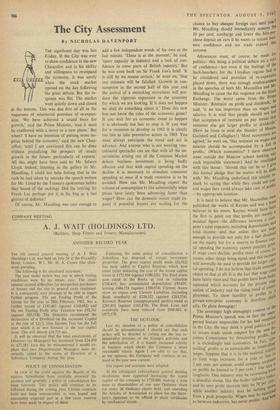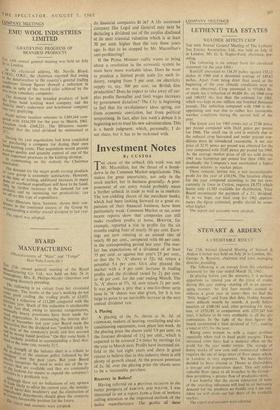The City Assessment
By NICHOLAS DAVENPORT
THE significant day was last Friday. If the City was ever to show confidence in the new Chancellor and in his ability and willingness to re-expand the economy, it was surely when the stock market opened on the day following the great debate. But the re- sponse was flat. The market went quietly down and closed at the bottom. This was due first of all to the vagueness of ministerial promises of re-expan- sion. 'We have achieved a sound basis for growth,' said the Prime Minister, `and it must be confirmed with a move to a new phase.' But when? 'I have no intention of putting more im- petus behind the economy,' said the new Chan- cellor, 'until I am convinced this can be done without prejudicing the prospect of steady growth in the future, particularly of exports.' All this might have been said by Mr. Selwyn Lloyd. Indeed, listening in the gallery to Mr. Maudling. I could not help feeling that in the rush he had taken by mistake the speech written for Mr. Lloyd by the Treasury spokesmen before they heard of the sackings. Did the retiring Sir Frank Lee perhaps put it in his bag as a last gesture of defiance?
Of course, Mr. Maudling was cute enough to
add a few independent words of his own at the last minute. There is at the moment,' he said, 'spare capacity in industry and a lack of con- fidence in some parts of British industry.' But he was soon back on Sir Frank Lee's brief. 'It is still by no means certain,' he went on, 'that our estimate will be falsified. Growth in con- sumption in the second half of this year and the arrival of a restocking movement will pro- duce the vigorous expansion in the economy for which we are looking. If it does not happen we shall do something about it.' Does this new boy not know the rules of the economic game? If you wait for an economic event to happen it is obviously too late to stop it. If you wait for a recession to develop in 1962 it is clearly too late to take preventive action in 1963. You must always anticipate the trend and act in advance. And anyone who is not wearing rose- coloured spectacles can see that with all the un- certainties arising out of the Common Market debate business investment is being badly affected and that with capital spending on the decline it is necessary to stimulate consumer spending at once if a trade recession is to be avoided. How can Mr. Maudling expect the volume of consumption to rise substantially when prices have lately been advancing faster than wages? How can the domestic motor trade ex- pand if potential buyers are waiting for the THE SPECTATOR. AUGUST 3, 1962 chance to buy cheaper foreign cars next year? Mr. Maudling should immediately remove the 10 per cent. surcharge and lower the hire-Pur" chase deposit on cars if he wants to restore busi- ness confidence and see trade expand this autumn.
Allowances must, of course, be made for politics—this being a political debate on a vote of confidence—but even if the feelings of the back-benchers for the Lloydian regime had t° be considered and promises of re-expansion played down, there was enough unpleasantness in the speeches of both Mr. Macmillan and Mr. Maudling to cause the flat response on the Stock Exchange. The worst came from the Prime Minister. 'Restraint on profit and dividends; he said, 'is no less important than on wages and, salaries. It is vital that people should not feel that acceptance of restraint on pay meant that someone else got larger profits or dividends.' (How he loves to steal the thunder of Messrs' Gaitskell and Callaghan!) 'Most economists are agreed,' he went on, 'that restraint on wages and
,
salaries should be accompanied by a fall 11/_, profits.' (Which economists? I have observe" none outside the Moscow school making any such impossible statement.) And he concluded with this threat: 'Should that not be so I give this formal pledge that the matter will be dealt with.' Mr. Maudling underlined this sinister re- mark by saying that while they could not con- trol wages they could always take care of Pro' —by appropriate taxation.
It is hard to believe that Mr. Macmillan once
published the works of Keynes and was a keen believer in his tenets. Keynes would have been the first to point out that profits are merely residual figure—the difference between a com- pany's total expenses, including depreciation• and total income--and that unless they are Jarg, enough to provide not only for a fair dividend on the equity but for a reserve to finance eaPl: tal spending the economy cannot possibly gr°, If wage costs decline, profits must of course In; crease, other things being equal, and this increasi, will normally be used to provide for larger capi- tal spending. I do not believe that trade union's.
;
object to that at all. It is the fact that wagecoshr have lately risen and that profits have been had squeezed which accounts for the present Stag- nation of industry and the rising trend of unerrva ployment. To show hostility to profits in private-enterprise ote-rielpltearinprdiseemaegcoognyolmy is therefore Pin' the The seemingly high demagogic content 0f g, Prime Minister's speech was in fact the un!on in the City. He may think it good pol itiresceP"trY pected feature responsible for his bad to fir to secure trade union support for the new but comes Commission by threatening profits, ‘,00- it is exceedingly bad economics. In fact, trolling' profits is as unworkable as `controlling ri wtoagleims.itSuwpapgoeseinthcaret aisteiss fitoIrthae nationalttiviltoe set:05or 3 per cent. per annum, could company surPlti or profits be limited to 3 per cent.? 1 he m idre,"il
is laughable. One industry may be recovering "' tadaY• a dreadful slump, like the boiler industry
cent' and its next profit increase may be 34;) Per via while another industry may be turning alt cl°, A
se‘'
from a peak rosperity. Wages may be equ as between industries. but never profits. And hog do financial companies fit in? A life assurance company like Legal and General may next be declaring a dividend out of the surplus disclosed at its next triennial valuation which is at least 50 per cent. higher than the rate three years ago. Is that to be stopped by Mr. Macmillan's anti-profiteering? If the Prime Minister really wants to bring about a revolution in the economic system he must have more workable ideas. Does he want to produce a limited profit scale for each in- dustry, ranging from 5 per cent. on electricity supply to, say, 500 per cent. on British film production? Does he expect to take away all sur- plus profits thereafter and limit wages increases by government dictation? The City is beginning to feel that his revolutionary ideas spring, not from economic conviction, but from political temporising. In fact, after last week's debate it is beginning not to trust his new administration. This is a harsh judgment, which, personally, I do not share, but it has to be reckoned with.































 Previous page
Previous page